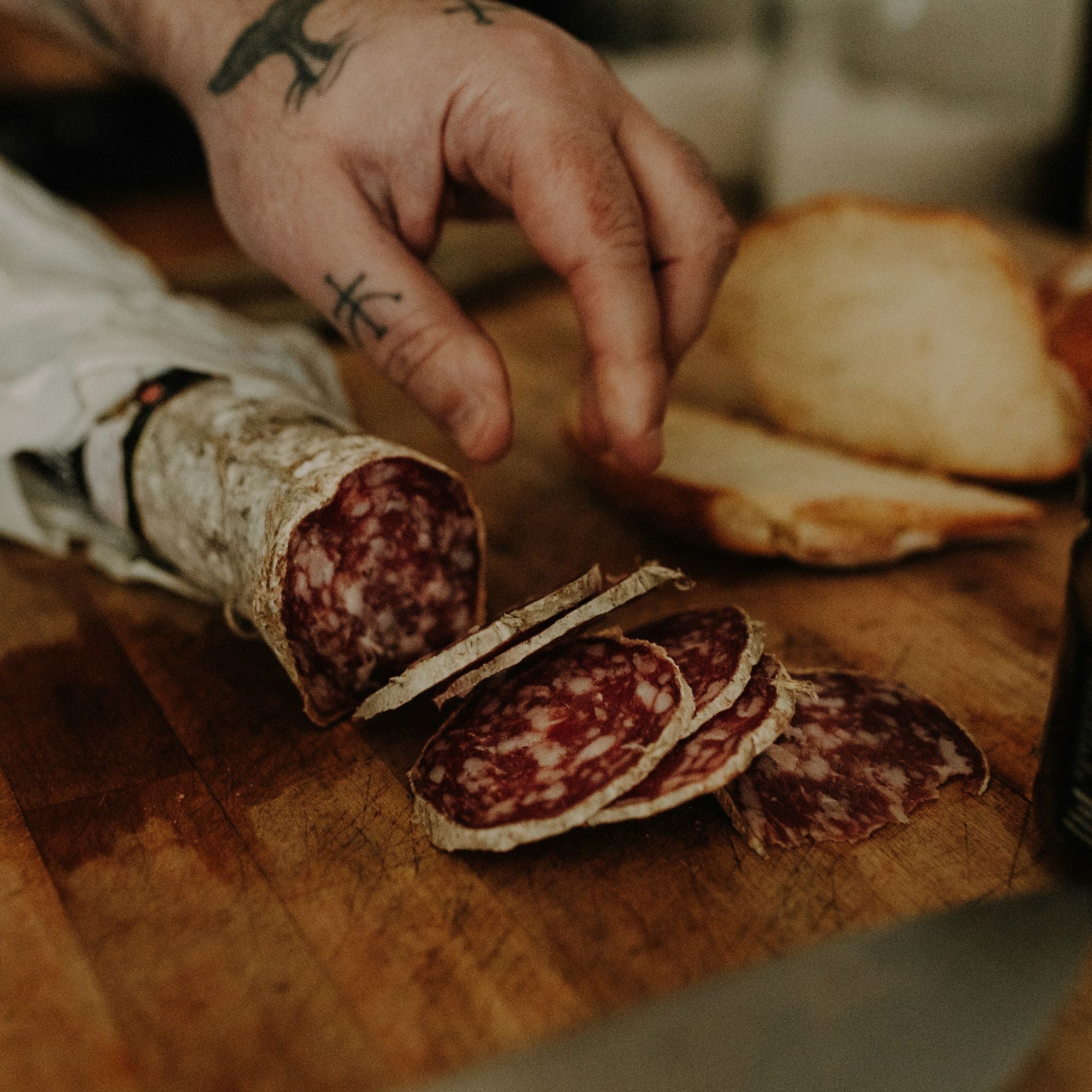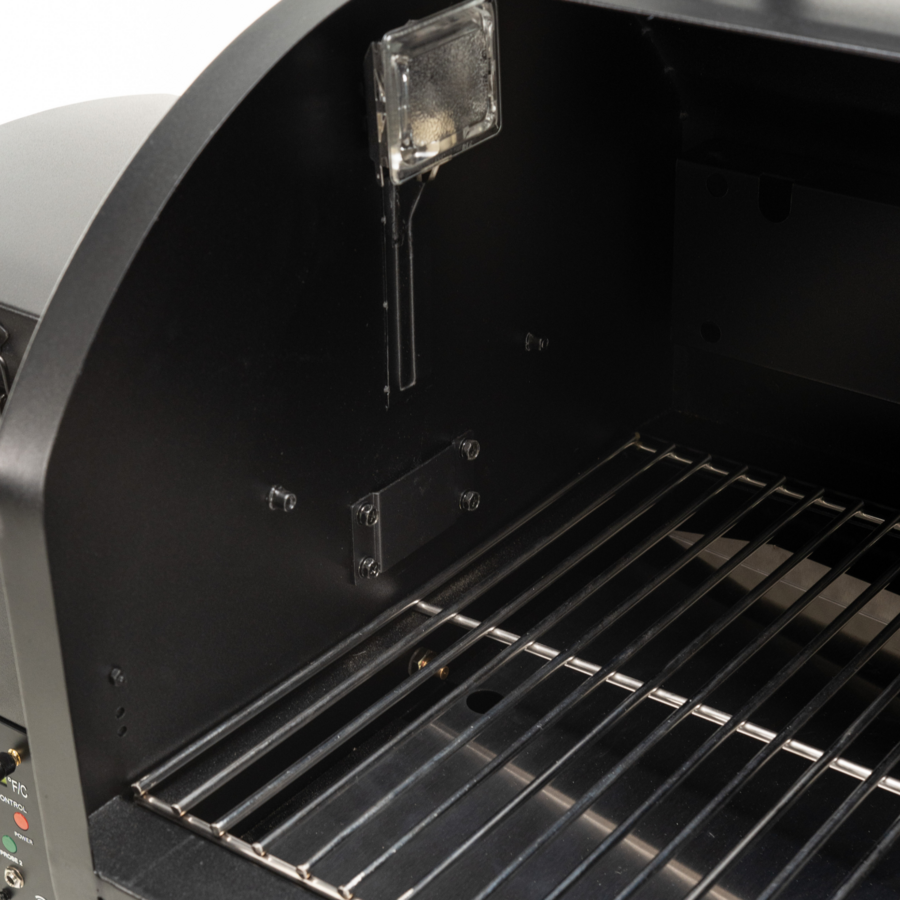When it comes to barbequing and smoking, true diehards will tell you that not all fuels are created equal and that wood reigns supreme. And while wood does offer a deeper, smokier flavour, we don't always have time for that! Luckily, there are numerous fuel options available to explore, some faster, some easier, and some imparting truly mouthwatering flavour you can't beat.
The fuel you choose shapes how you approach your cooking and can make or break the final flavour profile of a meal. There are heaps of options available for both smokers and BBQs, so understanding the benefits and trade-offs of each is important if you’re going to achieve the eye-catching look and mouthwatering taste you’re going for.
In this special Hark BBQ guide, we’ll explore various barbeque fuel types, including charcoal types, wood types, propane vs. natural gas, and electric options. We’ll also cover some useful topics like environmental impact, cost comparisons, cooking times, flavour profiles, storage tips, and safety considerations.
Understanding Your Options: Fuel Types
Charcoal Types
Charcoal imparts a satisfying smoky flavour and remains one of the most popular barbeque fuels. In general, there are two types: briquettes and lump charcoal.
- Briquettes: These are uniform in shape and size, making them easy to control for consistent heat. They are often made from compressed sawdust and other additives, which can affect the flavour slightly.
- Lump Charcoal: Made from natural hardwood, lump charcoal burns hotter and faster, producing a more authentic smoky flavour without additives. However, it tends to burn unevenly, making the cooking process a lot more intensive.
When deciding between briquettes and lump charcoal, consider whether you prioritise flavour intensity or ease of use. It’s good to look for products with lighter fluid additives, self-starting chemicals, and artificial flavour additives.
Wood Types: Chips, Pellets, Chunks, and Flavoured Bisquettes
If you’re a true BBQ or smoking diehard, then wood is probably your go-to fuel. Wood is a fantastic fuel source for those who love to get creative with their flavours. At Hark BBQ, we offer a diverse range of wood fuel products that will impart delicious flavour to your meat.
Wood Chips: Wood chips work best for short cooking times under 20 minutes, so small cuts of meat and fish. They burn quickly and impart a light, smoky flavour.
Wood Chunks: Chunks are perfect for long sessions that last over an hour and provide a deeper, smoky flavour. We recommend using wood chunks for larger cuts of meat just due to the cooking time required.
Wood Pellets: Our wood pellets are designed for consistent performance and can be an excellent choice for both smokers and pellet grills.
At Hark we offer a heap of different flavours for you to play with.
- Hickory: Strong but balanced, with a hint of sweetness—ideal for pork, beef, and chicken.
- Apple: Mild and delicate with a subtle sweetness, perfect for pork, beef, and vegetables.
- Cherry: Offers a fruity, mild smoke that gives your food a lovely reddish hue; versatile for various meats and vegetables.
- Mesquite: Bold and distinct, a go-to for Texas-style beef barbeque.
- Pecan: Similar to hickory yet sweeter, excellent for heavier meats like beef and lamb.
- Jack Daniel's Whisky Barrel: A unique option that brings a distinctive flavour derived from aged whisky barrels.
Usage Tips
- Fruit Woods (Apple, Cherry, Pecan): These are milder and work beautifully with poultry and pork.
- Hardwoods (Hickory, Mesquite, Oak): If you're after a stronger, more pronounced flavour, these are your best bet for beef and lamb.
- Experiment: Mix and match different wood types to craft a unique flavour profile that suits your dish.
Pro Tip: The amount and type of wood you use can greatly impact the final taste of your food, so don’t be afraid to experiment with our extensive range of wood products.
Propane vs. Natural Gas
For those who prefer convenience and extra control, gas barbeques are a popular alternative. The two primary types are propane and natural gas grills, each with its own set of advantages.
- Propane: Propane grills and smokers are favoured for their portability and the fact that propane tanks are widely available. They offer quick start-up times and excellent heat control, making them ideal for both seasoned grillers and beginners. At Hark we offer a range of gas smokers that are beginner-friendly and can be used in conjunction with our woodchip range.
- Natural Gas: These grills are often permanently connected to a gas line, reducing the need for frequent tank replacements. They tend to be more cost-effective in the long run, though initial installation can be more complex.
When choosing between propane and natural gas, consider factors such as your cooking frequency, budget, and whether you prefer a mobile or stationary grilling setup.
Electric Options
Electric barbeques are another emerging option that offers convenience and flavour without the mess that comes with wood and charcoal options
- Advantages: They are easy to use, require minimal maintenance, and provide consistent heat. Electric grills are also a great option for indoor cooking during colder months.
- Considerations: While convenient, electric grills may not offer the same smoky flavour as traditional fuels. However, many models now come with smoke boxes or flavour enhancers to mimic the taste of charcoal or wood-fired cooking.
Electric options are ideal for those who prioritise convenience and a clean cooking process while still wanting to enjoy the barbeque experience.
Evaluating the Bigger Picture: Key Considerations
Environmental Impact
These days we all like to make environmentally conscious choices, so it’s good to know what kind of impact our fuel choices are making.
- Charcoal: Traditional charcoal production can contribute to deforestation and releases a large amount of carbon dioxide during combustion. Opting for eco-friendly brands that use sustainable practices can mitigate these concerns.
- Wood: Similarly, the sustainability of wood depends on sourcing. Look for suppliers who practice responsible forestry.
- Propane and Natural Gas: These fuels burn cleaner than charcoal, emitting fewer particulates, although they are still fossil fuels.
- Electric: If your electricity comes from renewable sources, electric barbeques may be the most environmentally friendly option.
By weighing the environmental impact, you can choose a fuel that aligns with your personal values and contributes to a greener planet.
Cost Comparisons
Budget is always a factor in choosing the right barbeque fuel.
- Upfront Costs: Electric grills and gas systems often come with higher initial costs compared to charcoal grills.
- Operating Costs: Charcoal and wood fuels can be more expensive over time due to frequent replenishment, while propane and natural gas typically offer lower ongoing costs, especially when used in high volumes.
- Maintenance: Electric grills generally require less maintenance, which can save money and time in the long run.
Conducting a cost-benefit analysis tailored to your usage patterns and budget constraints will help you make a well-informed decision.
Cooking Times and Flavour Profiles
Different fuels not only influence the flavour of your food but also affect cooking times.
- Charcoal and Wood: These fuels typically produce a more pronounced smoky flavour and are perfect for slow-cooking methods like smoking and low-and-slow barbequing. However, the cooking process may be longer and requires careful monitoring of heat levels.
- Gas and Electric: These fuels heat up quickly and allow for more controlled cooking environments, making them suitable for fast grilling and searing. The flavour profile might be less smoky, but many enthusiasts find the trade-off acceptable for the sake of convenience and speed.
Understanding how each fuel impacts both cooking times and flavour profiles can help you align your choice with the type of meals you enjoy preparing.
Storage Tips
Proper storage of your barbeque fuel is crucial for safety and maintaining quality.
- Charcoal and Wood: Keep these fuels in a dry, well-ventilated area away from any sources of ignition. Humidity can affect the burning efficiency and flavour.
- Propane Tanks: Store propane tanks outdoors in a secure, upright position to avoid potential hazards. Ensure they are protected from extreme weather conditions.
- Electric Components: For electric grills, keep cords and electrical connections in good condition and store the grill in a dry place when not in use.
Adhering to storage tips not only prolongs the lifespan of your fuel but also guarantees a safer cooking environment.
Safety Considerations
Safety should always be a top priority when handling any barbeque fuel.
- General Practices: Always follow manufacturer instructions, and never leave your grill unattended while in use.
- Fuel-Specific Safety: With charcoal and wood, ensure adequate ventilation to prevent carbon monoxide buildup. For propane and natural gas grills, regular inspections for leaks and proper connection checks are critical.
-
Electric Grills: Confirm that electrical outlets and extension cords are rated for outdoor use and are free of damage.
By integrating safety considerations into your barbeque routine, you can enjoy a delicious meal without unnecessary risks.
Bringing It All Together
Choosing the right barbeque fuel for your needs involves balancing various factors. From the robust, smoky flavours of charcoal and wood to the convenience and efficiency of gas and electric options, each fuel type has its distinct advantages. Environmental impact, cost comparisons, cooking times, flavour profiles, storage tips, and safety considerations all contribute to the decision-making process. Here are some final tips to help you make the best choice:
- Assess Your Cooking Style: Are you a slow-cooking enthusiast who enjoys the ritual of tending to a charcoal grill, or do you prefer the speed and convenience of a gas or electric grill?
- Budget Wisely: Factor in both the upfront investment and ongoing costs of the fuel type you choose.
- Consider Your Environment: Evaluate the environmental impact of your fuel, and opt for more sustainable options if possible.
- Prioritise Safety: Regardless of your choice, adhere to strict safety protocols and proper storage practices.
- Experiment and Enjoy: Don’t be afraid to try different fuels and combinations. Many seasoned grillers mix charcoal with wood chips or switch between propane and natural gas depending on the occasion.
In the end, the perfect barbeque fuel is one that aligns with your lifestyle, budget, and culinary goals. With the right choice, you not only improve the taste of your food but also create memorable outdoor cooking experiences for family and friends.
Ready to Grill Like a Pro?
Now that you’re equipped with the knowledge of various barbeque fuels and their pros and cons, it’s time to take your grilling game to the next level. Whether you’re looking for the rich flavour of wood, the convenience of gas, or the modern touch of electric, Hark BBQ has the perfect fuel for your needs.
Explore our wide range of high-quality barbeque fuels and accessories today.
Buy your BBQ fuel from Hark BBQ for smokey, delicious grilled goodness every time!
For more options and inspiration, check out our great BBQ Fuel Australia collection.



